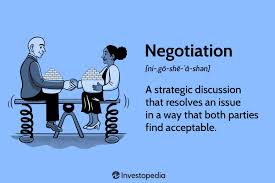Training course on Negotiation Skills for Renewable Energy Deals
Training Course on Negotiation Skills for Renewable Energy Deals is designed to equip professionals with the crucial skills and insights necessary to navigate complex negotiations in this dynamic field.
Skills Covered

Course Overview
Training Course on Negotiation Skills for Renewable Energy Deals
Introduction
Negotiation is a vital skill in the renewable energy sector, where diverse stakeholders come together to establish agreements that drive sustainable projects. As the industry evolves, effective negotiation strategies are essential for securing favorable terms, building robust partnerships, and achieving successful project outcomes. Training Course on Negotiation Skills for Renewable Energy Deals is designed to equip professionals with the crucial skills and insights necessary to navigate complex negotiations in this dynamic field. By mastering negotiation techniques, participants can enhance their ability to advocate for their interests while fostering collaboration among various stakeholders.
Throughout this course, participants will explore the key principles and best practices of negotiation tailored specifically for renewable energy contexts. From preparation and planning to managing conflicts and closing deals, attendees will learn how to effectively engage with partners, investors, and regulatory bodies. Through case studies and interactive exercises, participants will gain practical experience in applying negotiation strategies that lead to win-win outcomes. By the end of this course, participants will be empowered to negotiate effectively, ensuring successful renewable energy initiatives that contribute to a sustainable energy future.
Course Objectives
- Understand the fundamentals of negotiation in renewable energy.
- Analyze key principles and techniques of effective negotiation.
- Evaluate the importance of preparation and planning for negotiations.
- Explore strategies for engaging diverse stakeholders effectively.
- Assess the role of communication in negotiation processes.
- Investigate tactics for managing conflicts and reaching agreements.
- Discuss best practices for closing deals and follow-up actions.
- Develop skills in negotiating renewable energy contracts and agreements.
- Identify common challenges in renewable energy negotiations.
- Create actionable negotiation plans for various scenarios.
- Analyze case studies of successful negotiations in renewables.
- Leverage digital tools to enhance negotiation effectiveness.
- Understand the legal and ethical considerations in negotiation.
Target Audience
- Renewable energy project managers
- Policy makers and government officials
- Financial analysts and investment professionals
- Legal advisors and contract managers
- Sustainability officers and environmental managers
- Graduate students in public policy or energy studies
- Non-profit organization leaders focused on renewable energy
- Industry representatives in renewable technologies
Course Duration: 5 Days
Course Modules
Module 1: Introduction to Negotiation in Renewable Energy
- Overview of negotiation concepts and terminology.
- Importance of negotiation in renewable energy projects.
- Current trends and challenges in negotiations.
- Key components of successful negotiation strategies.
- Case studies highlighting effective practices.
Module 2: Principles of Effective Negotiation
- Analyzing foundational principles of negotiation.
- Understanding interests vs. positions.
- Discussing win-win vs. win-lose outcomes.
- Evaluating the role of ethics in negotiation.
- Real-world examples of successful negotiation principles.
Module 3: Preparation and Planning for Negotiations
- Techniques for effective preparation and research.
- Identifying goals, objectives, and desired outcomes.
- Understanding the other party’s interests.
- Developing negotiation strategies and tactics.
- Real-world examples of successful preparation.
Module 4: Engaging Stakeholders in Negotiations
- Identifying key stakeholders in renewable energy deals.
- Techniques for building rapport and trust.
- Importance of active listening and empathy.
- Managing diverse interests and perspectives.
- Case studies on effective stakeholder engagement
Module 5: Communication Skills for Negotiation
- Overview of effective communication techniques.
- Role of body language and non-verbal cues.
- Techniques for clear and persuasive messaging.
- Importance of feedback and clarification.
- Real-world examples of successful communication
Module 6: Conflict Management and Resolution
- Identifying common sources of conflict in negotiations.
- Techniques for managing and resolving conflicts.
- Importance of staying calm and focused.
- Strategies for finding common ground.
- Case studies on successful conflict resolution.
Module 7: Closing the Deal
- Techniques for effectively closing negotiations.
- Importance of summarizing agreements.
- Strategies for confirming commitments and follow-up actions.
- Role of contracts and documentation.
- Real-world examples of successful deal closures.
Module 8: Negotiating Renewable Energy Contracts
- Key elements in renewable energy contracts.
- Terms and conditions specific to energy agreements.
- Negotiation tactics for favorable outcomes.
- Case studies of successful contract negotiations.
- Skills in drafting and reviewing contracts.
Training Methodology
- Interactive Workshops: Facilitated discussions, group exercises, and problem-solving activities.
- Case Studies: Real-world examples to illustrate successful community-based surveillance practices.
- Role-Playing and Simulations: Practice engaging communities in surveillance activities.
- Expert Presentations: Insights from experienced public health professionals and community leaders.
- Group Projects: Collaborative development of community surveillance plans.
- Action Planning: Development of personalized action plans for implementing community-based surveillance.
- Digital Tools and Resources: Utilization of online platforms for collaboration and learning.
- Peer-to-Peer Learning: Sharing experiences and insights on community engagement.
- Post-Training Support: Access to online forums, mentorship, and continued learning resources.
Register as a group from 3 participants for a Discount
Send us an email: info@datastatresearch.org or call +254724527104
Certification
Upon successful completion of this training, participants will be issued with a globally recognized certificate.
Tailor-Made Course
We also offer tailor-made courses based on your needs.
Key Notes
- Participants must be conversant in English.
- Upon completion of training, participants will receive an Authorized Training Certificate.
- The course duration is flexible and can be modified to fit any number of days.
- Course fee includes facilitation, training materials, 2 coffee breaks, buffet lunch, and a Certificate upon successful completion.
- One-year post-training support, consultation, and coaching provided after the course.
- Payment should be made at least a week before the training commencement to DATASTAT CONSULTANCY LTD account, as indicated in the invoice, to enable better preparation.